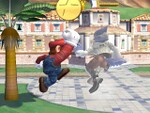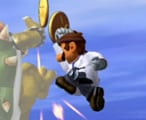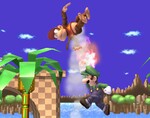Super Jump Punch: Difference between revisions
(→Mario) |
|||
| Line 9: | Line 9: | ||
==Dr. Mario== | ==Dr. Mario== | ||
[[Image:Dr.Mario Super Jump Punch.jpg|frame|Dr. Mario's Super Jump Punch]] | [[Image:Dr.Mario Super Jump Punch.jpg|frame|Dr. Mario's Super Jump Punch]] | ||
When Dr. Mario performs the attack, coins fly out of the enemy, and the foe receives about 12% damage. Dr. Mario's version of the attack is the exact same as Mario's, but is more powerful, and scores | When Dr. Mario performs the attack, coins fly out of the enemy, and the foe receives about 12% damage. Dr. Mario's version of the attack is the exact same as Mario's, but is more powerful, and scores fewer hits. Also, the sound effect is different than the usual sound made when Mario grabs a coin. Using the cape to aid his version of the recovery is more noticeable and helpful than Mario's. | ||
==Luigi== | ==Luigi== | ||
Revision as of 18:28, March 18, 2010
The Super Jump Punch is a third jump that Mario and Luigi can perform in all three titles. Dr. Mario also shares this move with them in Melee. It is executed by pressing B while holding the control stick upwards; thus, it is their up B attack. When performed by either of the "Marios," they jump up diagonally with more vertical range than horizontal; if the attack strikes an enemy during the jump, coins fly out of the enemy, and the foe receives multiple hits for up to about 12% damage. The last hit of the attack deals a little knockback, but it can Star KO opponents if used near the upper blast line (especially in Brawl).
Mario
When Mario uses this attack each hit does 1% damage. Average damage is around 10-13%. Moderate knockback, though seems more powerful in Brawl. It is a poor recovery overall due to it's short range and easiness to be edgeguarded. However, using Cape will aid Mario's horizontal recovery, making recovering a little easier. Cape, combined with S.J.P.'s some horizontal and mainly vertical range will give Mario a good horizontal recovery, though the attack's normal angle will make it a terrible move to use vertically in some situations below the ledge. It is possible to "aim" both Mario's Super Jump Punch straight up vertically by holding the control stick in the opposite direction they are facing during the "spark" of the Super Jump Punch's animation, and can be angled vertically as well by aiming the control stick forward.
Dr. Mario
When Dr. Mario performs the attack, coins fly out of the enemy, and the foe receives about 12% damage. Dr. Mario's version of the attack is the exact same as Mario's, but is more powerful, and scores fewer hits. Also, the sound effect is different than the usual sound made when Mario grabs a coin. Using the cape to aid his version of the recovery is more noticeable and helpful than Mario's.
Luigi
Luigi's Super Jump Punch only deals 1 point of damage, and only makes a character flinch very slightly. However, if the attack's sweet spot hits a character, it becomes a powerful Fire Jump Punch which deals around 25% damage with high knockback and can KO an opponent at 70% damage or higher. Luigi can turn around after the initial hitbox, however, its usefulness is questionable. In Super Smash Bros. Melee, Luigi's attack sends him vertically without any horizontal range, forcing him to rely on his Green Missile for recovery. In Brawl, Luigi turns upside down at the peak of his jump, falling on his head. This allows for more horizontal movement after the move but has more landing lag compared to his Melee Super Jump Punch. The Fire Jump Punch if used in the air is slightly weaker(20% rather then 25%) than if used on the ground (in all three Super Smash Bros. games). It is possible to combo with it by small jumping, performing an n-air, and then using a sweetspotted punch at percentages around 40% with many characters. The Fire Jump Punch is often nicknamed Shoryuken due to its resemblance to the Shoryukeun attack from the Street Fighter games, involving a fast uppercut with good range usually to counter aerial assaults.
Origin
In the original Super Mario Bros. Mario and Luigi could hit blocks from below. Some of the blocks had coins they would release. This is where the coins that are released when this move is performed with the Mario Bros. Also, in the original Super Mario Bros., both Mario and Luigi hit the blocks with their fist. This is the reason they punch like that when they are performing the move. It is also identical to the "Rising Break" technique performed by Fighter Kirby and Knuckle Joe in Kirby Super Star, sans the coins.
Trivia
- Coins are the currency of the Mushroom Kingdom in the Mario series. In the Super Smash Bros. series, beginning with Super Smash Bros., they are created when the Jump Punch connects with an opponent. The appearance of these coins is modeled after the coins from Super Mario 64.
- In Melee, the appearance of the coins is the same as the original SSB, but the coins for the Trophy Lottery look similar as well as the Game Over screen. Also, these same coins are used on the Game Over screen in Brawl's Adventure or Classic Modes to continue, as well as the Coin Launcher. Lastly, there is a Coin sticker.
- This move is occasionally referred to as "Pay-Day Punch" given that Nintendo Power magazine gave this name to the move in its review for Super Smash Bros, due to the coins flying out of the enemy when dealing damage.
- The coins that appear are 2D sprites that always face the screen on the pause menu.
Video (Mario)
<youtube>wSYBG_1gmFE</youtube>
Template:Luigi Special Moves Template:Mario Special Moves Template:Dr. Mario Special Moves


